高中英语语法造句英语写作if条件句虚拟条件句(高级)
if虚拟语气的用法归纳

if虚拟语气的用法归纳IF虚拟语气是英语中的一种重要语法现象,主要用于表示与现实相反的假设、愿望、建议等。
它分为两种形式:if条件句和if非条件句。
以下是对IF虚拟语气用法的详细介绍:一、if条件句1. 表示与现在事实相反的假设:If + 主语+ 过去时态,主语+ would/could/might/should + 动词原形。
例如:If I were you, I would go to the party.(如果我处在你的位置,我会去参加派对。
)2. 表示与过去事实相反的假设:If + 主语+ had done,主语+ would/could/might/should + have done。
例如:If he had come to the meeting, he would have known the plan.(如果他参加了会议,他就会知道这个计划。
)二、if非条件句1. 表示建议、劝告:主语+ should/would/might/ought to + 动词原形。
例如:You should go to the party.(你应该去参加派对。
)2. 表示愿望:主语+ could/would/might + 动词原形。
例如:I wish I were a bird.(我希望我是一只鸟。
)3. 表示假设:If + 主语+ 动词过去式,主语+ would/could/might + 动词原形。
例如:If I had time, I would go to the park.(如果我有时间,我会去公园。
)三、if虚拟语气的特殊结构1. 省略if,将were、had、should等词置于主语之前:主语+ were/had/should + 动词原形。
例如:She were here, she would meet him.(如果她在这里,她会见到他。
)2. 使用倒装结构:were/had/should + 主语+ 动词原形。
高中英语if条件虚拟语气
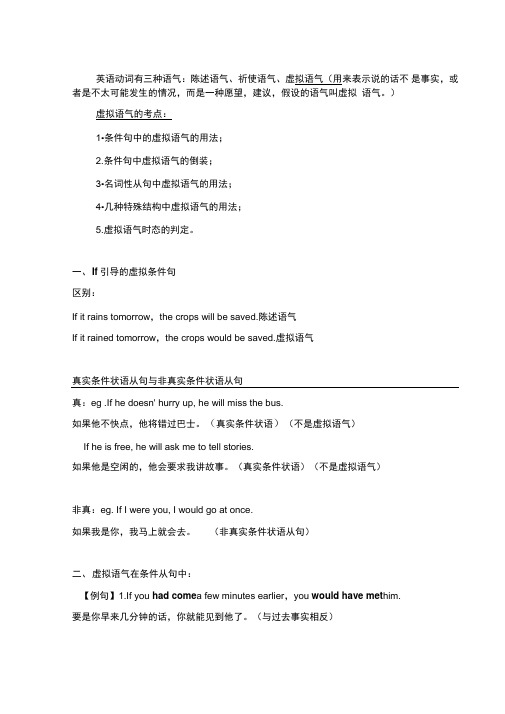
英语动词有三种语气:陈述语气、祈使语气、虚拟语气(用来表示说的话不是事实,或者是不太可能发生的情况,而是一种愿望,建议,假设的语气叫虚拟语气。
)虚拟语气的考点:1•条件句中的虚拟语气的用法;2.条件句中虚拟语气的倒装;3•名词性从句中虚拟语气的用法;4•几种特殊结构中虚拟语气的用法;5.虚拟语气时态的判定。
一、If引导的虚拟条件句区别:If it rains tomorrow,the crops will be saved.陈述语气If it rained tomorrow,the crops would be saved.虚拟语气真实条件状语从句与非真实条件状语从句真:eg .If he doesn' hurry up, he will miss the bus.如果他不快点,他将错过巴士。
(真实条件状语)(不是虚拟语气)If he is free, he will ask me to tell stories.如果他是空闲的,他会要求我讲故事。
(真实条件状语)(不是虚拟语气)非真:eg. If I were you, I would go at once.如果我是你,我马上就会去。
(非真实条件状语从句)二、虚拟语气在条件从句中:【例句】1.If you had come a few minutes earlier,you would have met him.要是你早来几分钟的话,你就能见到他了。
(与过去事实相反)2.lf it were sunny tomorrow, i would come to see you.明天要是天气好的话,我来看你。
(与将来事实可能相反)3.lf i were you, i would go at once.假如我是你的话,我会马上走。
(与现在事实相反,事实上我不可能是你)主从句的谓语形式(一)与现在事实相反的虚拟条件句表示与现在事实相反的情况,例 1.lf I were you, I would take an umbrella.如果我是你,我会带把伞。
50个高中英语高级句型及例句
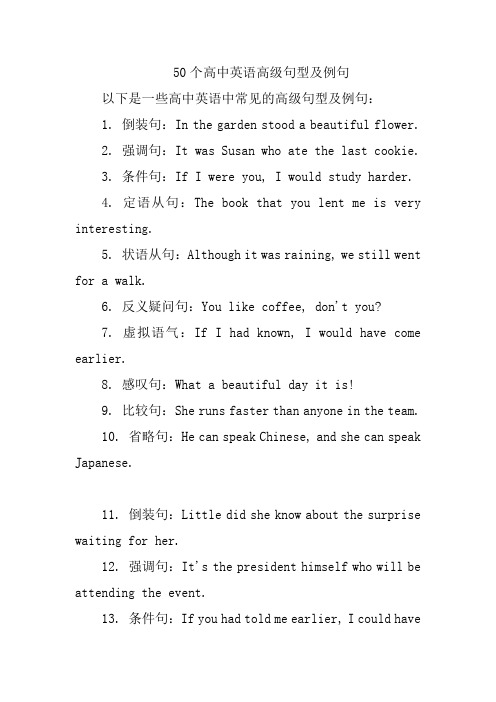
50个高中英语高级句型及例句以下是一些高中英语中常见的高级句型及例句:1. 倒装句:In the garden stood a beautiful flower.2. 强调句:It was Susan who ate the last cookie.3. 条件句:If I were you, I would study harder.4. 定语从句:The book that you lent me is very interesting.5. 状语从句:Although it was raining, we still went for a walk.6. 反义疑问句:You like coffee, don't you?7. 虚拟语气:If I had known, I would have come earlier.8. 感叹句:What a beautiful day it is!9. 比较句:She runs faster than anyone in the team.10. 省略句:He can speak Chinese, and she can speak Japanese.11. 倒装句:Little did she know about the surprise waiting for her.12. 强调句:It's the president himself who will be attending the event.13. 条件句:If you had told me earlier, I could havehelped.14. 定语从句:The car which crashed into the wall was badly damaged.15. 状语从句:While I was studying, my brother was playing video games.16. 反义疑问句:You don't like coffee, do you?17. 虚拟语气:If I were you, I wouldn't do that.18. 感叹句:How beautifully the flowers bloomed in the garden!19. 比较句:She sings as well as her sister does.20. 省略句:He can play the guitar; she, the piano.21. 倒装句:Never have I seen such a beautiful sunset before.22. 强调句:It is your responsibility to ensure the project's success.23. 条件句:Should you need any further assistance, please let us know.24. 定语从句:The person who stole my wallet has been caught.25. 状语从句:As she was running late, she missed the bus.26. 反义疑问句:You've never been there, have you?27. 虚拟语气:If I were a bird, I would fly around the world.28. 感叹句:What a fantastic performance they gave last night!29. 比较句:This book is more interesting than the one I read last week.30. 省略句:He loves swimming; his sister, dancing.31. 倒装句:Under the tree sat a man reading a book.32. 强调句:It was the best movie I have ever seen.33. 条件句:Unless you study hard, you won't pass the exam.34. 定语从句:The house where I grew up has been renovated.35. 状语从句:Whenever it rains, he stays indoors.36. 反义疑问句:You don't mind me borrowing your book, do you?37. 虚拟语气:If I hadn't missed the train, I would have been on time.38. 感叹句:How incredible the view from the top of the mountain is!39. 比较句:His performance is superior to that ofhis colleagues.40. 省略句:She likes playing the piano; he, the guitar.41. 倒装句:In the middle of the road lay a stray dog.42. 强调句:It was him who suggested the idea in the first place.43. 条件句:Suppose you were given a second chance, what would you do?44. 定语从句:The girl whose bag was stolen reported the incident to the police.45. 状语从句:Since it was a holiday, the streets were deserted.46. 反义疑问句:You won't be late for the meeting, will you?47. 虚拟语气:If I were in your shoes, I would have made the same decision.48. 感叹句:What a lovely surprise you've prepared for me!49. 比较句:This computer is more efficient than the one I used before.50. 省略句:He can swim; she, on the other hand, can't.这些句型可以帮助提高句子的表达力和复杂度,使文章更加丰富多彩。
高中英语高级句型例句及翻译
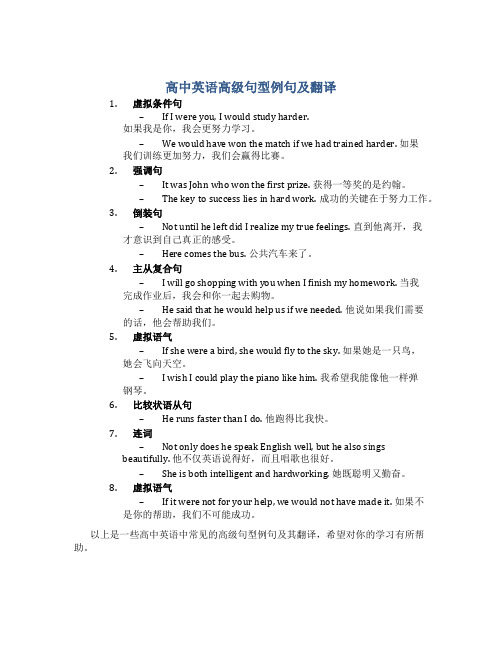
高中英语高级句型例句及翻译1.虚拟条件句–If I were you, I would study harder.如果我是你,我会更努力学习。
–We would have won the match if we had trained harder. 如果我们训练更加努力,我们会赢得比赛。
2.强调句–It was John who won the first prize. 获得一等奖的是约翰。
–The key to success lies in hard work. 成功的关键在于努力工作。
3.倒装句–Not until he left did I realize my true feelings. 直到他离开,我才意识到自己真正的感受。
–Here comes the bus. 公共汽车来了。
4.主从复合句–I will go shopping with you when I finish my homework. 当我完成作业后,我会和你一起去购物。
–He said that he would help us if we needed. 他说如果我们需要的话,他会帮助我们。
5.虚拟语气–If she were a bird, she would fly to the sky. 如果她是一只鸟,她会飞向天空。
–I wish I could play the piano like him. 我希望我能像他一样弹钢琴。
6.比较状语从句–He runs faster than I do. 他跑得比我快。
7.连词–Not only does he speak English well, but he also singsbeautifully. 他不仅英语说得好,而且唱歌也很好。
–She is both intelligent and hardworking. 她既聪明又勤奋。
8.虚拟语气–If it were not for your help, we would not have made it. 如果不是你的帮助,我们不可能成功。
if的虚拟语气的用法例句
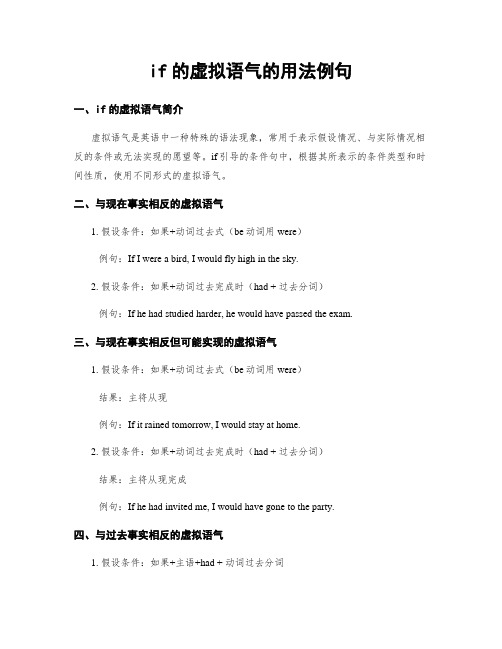
if的虚拟语气的用法例句一、if的虚拟语气简介虚拟语气是英语中一种特殊的语法现象,常用于表示假设情况、与实际情况相反的条件或无法实现的愿望等。
if引导的条件句中,根据其所表示的条件类型和时间性质,使用不同形式的虚拟语气。
二、与现在事实相反的虚拟语气1. 假设条件:如果+动词过去式(be动词用were)例句:If I were a bird, I would fly high in the sky.2. 假设条件:如果+动词过去完成时(had + 过去分词)例句:If he had studied harder, he would have passed the exam.三、与现在事实相反但可能实现的虚拟语气1. 假设条件:如果+动词过去式(be动词用were)结果:主将从现例句:If it rained tomorrow, I would stay at home.2. 假设条件:如果+动词过去完成时(had + 过去分词)结果:主将从现完成例句:If he had invited me, I would have gone to the party.四、与过去事实相反的虚拟语气1. 假设条件:如果+主语+had + 动词过去分词结果:主语+would/could/might + have + 过去分词例句:If I had known the truth, I would have made a different decision.2. 假设条件:如果+主语+had not +过去分词形式,结果也用一般过去时态例句:If we hadn't missed the train, we would have arrived on time.五、与将来事实相反的虚拟语气1. 假设条件:如果+动词过去式(be动词用were)结果:主将从现(应该+动词原形)例句:If they were here, they would help us.2. 假设条件:如果+should/were to/might/could/would + 动词原形结果:主将从现(应该+动词原形)例句:If he should call, please ask him to wait.六、虚拟语气中常用的连词和引导短语1. if: 引导条件状语从句,表示假设情况。
高中英语知识点归纳虚拟语气的用法总结
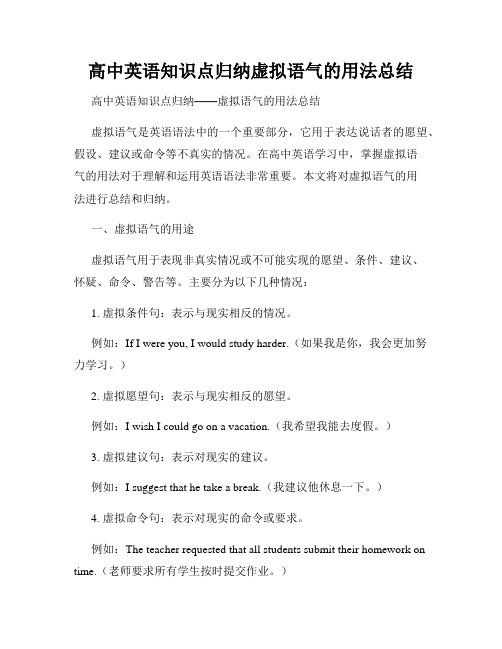
高中英语知识点归纳虚拟语气的用法总结高中英语知识点归纳——虚拟语气的用法总结虚拟语气是英语语法中的一个重要部分,它用于表达说话者的愿望、假设、建议或命令等不真实的情况。
在高中英语学习中,掌握虚拟语气的用法对于理解和运用英语语法非常重要。
本文将对虚拟语气的用法进行总结和归纳。
一、虚拟语气的用途虚拟语气用于表现非真实情况或不可能实现的愿望、条件、建议、怀疑、命令、警告等。
主要分为以下几种情况:1. 虚拟条件句:表示与现实相反的情况。
例如:If I were you, I would study harder.(如果我是你,我会更加努力学习。
)2. 虚拟愿望句:表示与现实相反的愿望。
例如:I wish I could go on a vacation.(我希望我能去度假。
)3. 虚拟建议句:表示对现实的建议。
例如:I suggest that he take a break.(我建议他休息一下。
)4. 虚拟命令句:表示对现实的命令或要求。
例如:The teacher requested that all students submit their homework on time.(老师要求所有学生按时提交作业。
)5. 虚拟警告句:表示对现实的警告或威胁。
例如:If you don't stop talking, I will call the police.(如果你不停止讲话,我会报警。
)二、虚拟语气的形式1. 虚拟语气在动词的形态上表现为过去式(一般过去时或过去完成时)。
例如:I suggested that he go to the library.(我建议他去图书馆。
)2. 虚拟语气在动词的形态上表现为"were"而不是"was"。
例如:If I were you, I would apologize.(如果我是你,我会道歉。
)3. 虚拟语气在情态动词的用法上表现为"should" + 动词原形。
(完整版)if引导的条件句中的虚拟语气
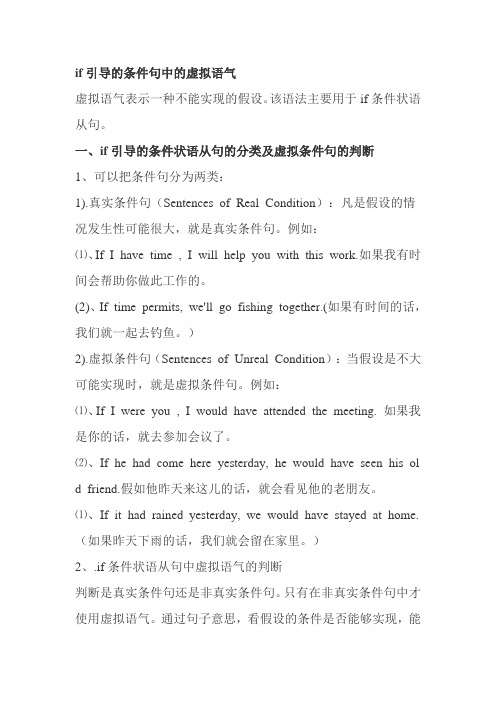
if引导的条件句中的虚拟语气虚拟语气表示一种不能实现的假设。
该语法主要用于if条件状语从句。
一、if引导的条件状语从句的分类及虚拟条件句的判断1、可以把条件句分为两类:1).真实条件句(Sentences of Real Condition):凡是假设的情况发生性可能很大,就是真实条件句。
例如:⑴、If I have time , I will help you with this work.如果我有时间会帮助你做此工作的。
(2)、If time permits, we'll go fishing together.(如果有时间的话,我们就一起去钓鱼。
)2).虚拟条件句(Sentences of Unreal Condition):当假设是不大可能实现时,就是虚拟条件句。
例如:⑴、If I were you , I would have attended the meeting. 如果我是你的话,就去参加会议了。
⑵、If he had come here yesterday, he would have seen his old friend.假如他昨天来这儿的话,就会看见他的老朋友。
⑴、If it had rained yesterday, we would have stayed at home.(如果昨天下雨的话,我们就会留在家里。
)2、.if条件状语从句中虚拟语气的判断判断是真实条件句还是非真实条件句。
只有在非真实条件句中才使用虚拟语气。
通过句子意思,看假设的条件是否能够实现,能够实现是真实条件句,不能使用虚拟语气;假设的条件不能实现则是非真实条件句,要用虚拟语气。
判断这个假设是与哪个事实相反。
通常有三种情况:①与过去事实相反。
②与现在事实相反。
③与将来事实可能相反。
3、“后退一步法”后退一步法是指在准确地判断了该句与哪一事实相反后,按虚拟语气的后退一步法处理从句谓语动词的时态。
if 条件句虚拟语气
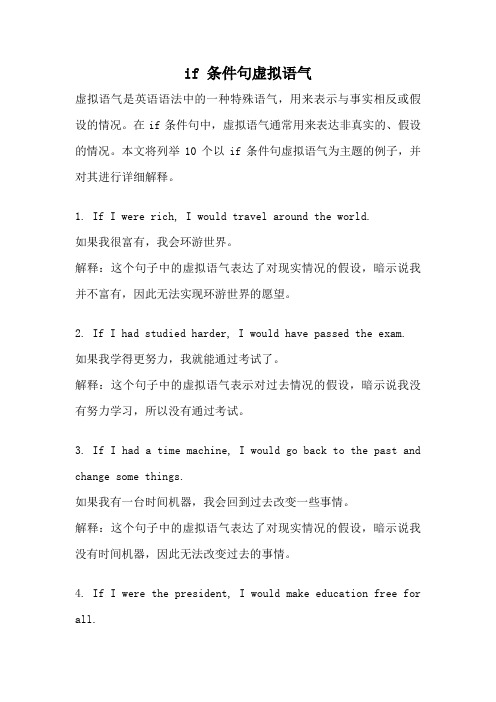
if 条件句虚拟语气虚拟语气是英语语法中的一种特殊语气,用来表示与事实相反或假设的情况。
在if条件句中,虚拟语气通常用来表达非真实的、假设的情况。
本文将列举10个以if条件句虚拟语气为主题的例子,并对其进行详细解释。
1. If I were rich, I would travel around the world.如果我很富有,我会环游世界。
解释:这个句子中的虚拟语气表达了对现实情况的假设,暗示说我并不富有,因此无法实现环游世界的愿望。
2. If I had studied harder, I would have passed the exam.如果我学得更努力,我就能通过考试了。
解释:这个句子中的虚拟语气表示对过去情况的假设,暗示说我没有努力学习,所以没有通过考试。
3. If I had a time machine, I would go back to the past and change some things.如果我有一台时间机器,我会回到过去改变一些事情。
解释:这个句子中的虚拟语气表达了对现实情况的假设,暗示说我没有时间机器,因此无法改变过去的事情。
4. If I were the president, I would make education free for all.如果我是总统,我会让教育对所有人免费。
解释:这个句子中的虚拟语气表达了对现实情况的假设,暗示说我并不是总统,所以无法实现让教育免费的目标。
5. If it didn't rain tomorrow, we could go hiking.如果明天不下雨,我们可以去远足。
解释:这个句子中的虚拟语气表达了对未来情况的假设,暗示说明天可能会下雨,所以无法去远足。
6. If I had known you were coming, I would have prepared a meal for you.如果我知道你要来,我会为你准备一顿饭。
- 1、下载文档前请自行甄别文档内容的完整性,平台不提供额外的编辑、内容补充、找答案等附加服务。
- 2、"仅部分预览"的文档,不可在线预览部分如存在完整性等问题,可反馈申请退款(可完整预览的文档不适用该条件!)。
- 3、如文档侵犯您的权益,请联系客服反馈,我们会尽快为您处理(人工客服工作时间:9:00-18:30)。
Complete these sentences. Remember what you have learned about the If-Clauses:
a) If global emissions aren’t reduced, huge areas of land (1-to be )
………………..flooded and the world economy (2- to collapse ) …………………….. By 2050 up to one million species (3- to become) ……………………extinct due to the loss of natural habitats.
b) I ( to hear ) ……………………….Bush’s speech, if I had stayed in last night, but I
went to the cinema and watched “The day after tomorrow”.
c) If you ( to listen ) ……………………………. to Tom and Judie’s conversation here last
night , you
( find ) …………………………………………….out what they think about living in the country.
d) If I lived in a city”, he said, “ I ( to have )…………………………………….all the
amenities at hand. Besides I like that feeling of not being isolated from the rest of the world. If I lived in the country, I ( to miss) ……………………… the hustle and bustle of the general day-to-day routine of a city.
e)If they use other forms of energy, …………………………………………………………..
f) If industrialised countries u se most of the world’s energy, ……………………………..
g) If rich countries continue to squander( = spend) their money on fuel, ……………….
h) If people ( not / be ) ………………………..careless, they (not / pollute )
…………………………… .
i)Lots of animals ( perish) ………………………….., i f we ( destroy )
……………………….rainforests.
j) If we (want ) ……………………….to protect the remaining rainforests, we (give ) …………………..our support to organisations like WWF( World Wild Fund For Nature )
Complete these sentences. Remember what you have learned about the If-Clauses:
a) If global emissions aren’t reduced, huge areas of land (1-to be )
………………..flooded and the world economy (2- to collapse ) …………………….. By 2050 up to one million species (3- to become) ……………………extinct due to the loss of natural habitats.
b) I ( to hear ) ……………………….Bush’s speech, if I had stayed in last night, but I
went to the cinema and watched “The day after tomorrow”.
c) If you ( to listen ) ……………………………. to Tom and Judie’s conversation here last
night , you
( find ) …………………………………………….out what they think about living in the country.
d) If I lived in a city”, he said, “ I ( to have )…………………………………….all the
amenities at hand. Besides I like that feeling of not being isolated from the rest of the world. If I lived in the country, I ( to miss) ……………………… the hustle and bustle of the general day-to-day routine of a city.
e)If they use other forms of energy, …………………………………………………………..
f) If industrialised countries u se most of the world’s energy, ……………………………..
g) If rich countries continue to squander( = spend) their money on fuel, ……………….
h) If people ( not / be ) ………………………..careless, they (not / pollute )
…………………………… .
i)Lots of animals ( perish) ………………………….., i f we ( destroy )
……………………….rainforests.
j) If we (want ) ……………………….to protect the remaining rainforests, we (give ) …………………..our support to organisations like WWF( World Wild Fund For Nature )
Answers:
a- will be will collapse will become
b-would have heard
c-had listened….would have found
d-would have… would miss
e- they will save a lot
f-the planet will be at risk
g-the air will be more and more polluted
h-weren’t…..wouldn’t pollute
i-will/ would perish...............destroy/ destroyed j-want . (iv)。
